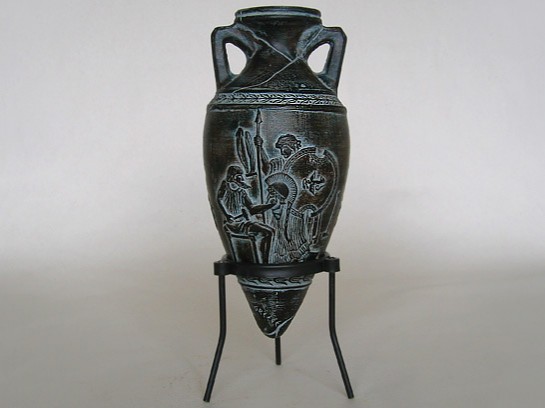Hephaestus was the Greek god whose Roman equivalent was Vulcan he was the god of technology including, specifically blacksmiths, craftsmen, artisans, sculptors, metals and metallurgy, and fire.
He was worshiped in all the manufacturing and industrial centers of Greece, especially Athens.
Though his forge traditionally lay in the heart of Lemnos, Hephaestus was quickly identified by Greek colonists in southern Italy with the volcano gods Adranus of Mount Etna and Vulcanus of the Lipara islands, and his forge moved here by the poets. The first-century sage Apollonius of Tyana is said to have observed, "there are many other mountains all over the earth that are on fire, and yet we should never be done with it if we assigned to them giants and gods like Hephaestus".
Hephaestus and his brother Ares were sons of Hera, with or without the cooperation of Zeus. In classic and late interpretations, Hera bore him alone, in jealousy for Zeus's solo birth of Athena, but as Hera is older than Zeus in terms of human history, the myth may be an inversion. Indeed, in some versions of Athena's birth, the goddess only enters the world after Zeus' head is split open by a hammer-wielding Hephaestus.
Either way, in Greek thought, the fates of the goddess of wisdom and war (Athena) and the god of the forge that makes the weapons of war were linked. In Attica, Hephaestus and Athena Ergane (Athena as patroness of craftsmen and artisans), were honored at a festival called Chalceia on the 30th day of Pyanepsion. Hephaestus crafted much of Athena's weaponry, along with those of the rest of the gods and even of a few mortals who received their special favor.
An Athenian founding myth tells that Athena refused a union with Hephaestus, and that when he tried to force her she disappeared from the bed. Hephaestus ejaculated on the earth, impregnating Gaia, who subsequently gave birth to Erichthonius of Athens then the surrogate mother gave the child to Athena to foster, guarded by a serpent. Hyginus made an etymology of strife (Eri-) between Athena and Hephaestus and the Earth-child (chthonios).
Some readers may have the sense that an earlier, non-virginal Athena is disguised in a convoluted re-making of the myth-element. At any rate, there is a Temple of Hephaestus (Hephaesteum or the so-called "Theseum") located near the Athens agora, or marketplace.
On the island of Lemnos, his consort was the sea nymph Cabeiro, by whom he was the father of two metalworking gods named the Cabeiri.In Sicily, his consort was the nymph Aetna, and his sons two gods of Sicilian geysers called Palici.
Product Details
Code: 340
Dimensions: 9,5x21,5cm
Colors: White, Black, Brown
